 MyDogBreeds
MyDogBreeds Both Bearded Collie and American Staffordshire Terrier are originated from United Kingdom. Bearded Collie may grow 7 cm / 3 inches higher than American Staffordshire Terrier. Both Bearded Collie and American Staffordshire Terrier are of same weight. Both Bearded Collie and American Staffordshire Terrier has almost same life span. Both Bearded Collie and American Staffordshire Terrier has same litter size. Bearded Collie requires High maintenance. But American Staffordshire Terrier requires Low maintenance
Both Bearded Collie and American Staffordshire Terrier are originated from United Kingdom. Bearded Collie may grow 7 cm / 3 inches higher than American Staffordshire Terrier. Both Bearded Collie and American Staffordshire Terrier are of same weight. Both Bearded Collie and American Staffordshire Terrier has almost same life span. Both Bearded Collie and American Staffordshire Terrier has same litter size. Bearded Collie requires High maintenance. But American Staffordshire Terrier requires Low maintenance
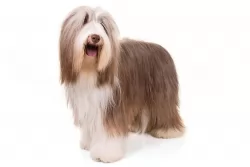 This long-haired herding breed was bred by mixing the two sheepdog breeds: the Scottish dogs and the Polish sheepdogs. The Bearded Collie gained the popularity during the last century by winning some of the Dog Shows. This friendly dog with the beautiful coat is surely one of the most specific pets. Nowadays, the Bearded Collie is very popular. The organizations for breeding, saving, rescuing and adopting this breed can be found in the USA.
This long-haired herding breed was bred by mixing the two sheepdog breeds: the Scottish dogs and the Polish sheepdogs. The Bearded Collie gained the popularity during the last century by winning some of the Dog Shows. This friendly dog with the beautiful coat is surely one of the most specific pets. Nowadays, the Bearded Collie is very popular. The organizations for breeding, saving, rescuing and adopting this breed can be found in the USA.
 The American Staffordshire Terrier is a part of all the confusion surrounding the group of “pit bulls”. The American Staffordshire Terrier is directly related to the English Bull Terrier and English Terrier. The breed of the English Staffordshire Terrier was bred in the early 19th century in the West Midlands. It was not until later that the breed came from Staffordshire. These English Staffordshire Terriers are also the source of contention by breeders who insist it was the Fox Terrier, White English Terrier, Tan and Black Terrier that are the ancestors of the English Staffordshire Terrier.
The American Staffordshire Terrier is a part of all the confusion surrounding the group of “pit bulls”. The American Staffordshire Terrier is directly related to the English Bull Terrier and English Terrier. The breed of the English Staffordshire Terrier was bred in the early 19th century in the West Midlands. It was not until later that the breed came from Staffordshire. These English Staffordshire Terriers are also the source of contention by breeders who insist it was the Fox Terrier, White English Terrier, Tan and Black Terrier that are the ancestors of the English Staffordshire Terrier.
These terriers (AKA pit bull terrier) came to the United States in the mid 1800’s. By the late 1890’s they were accepted by the United Kennel Club (UKC)as the American Pit Bull Terrier – a new and distinct breed. There were also some that were accepted into the AKC as the Staffordshire Terrier. In England they were still known as the American Staffordshire Terrier. When the AKC accepted the breed in 1936 they were given a new standard, new purpose and new group – the terrier. In 1969 the American Kennel Club recognized these dogs as American Staffordshire Terriers and refused to recognize the American Pit Bull Terrier. The name was changed to move the breed away from its characterization as a bull fighter and to distinguish it from the smaller English Staffordshire Terrier. All American Staffordshire Terriers are directly related to the American Pit Bull Terriers.
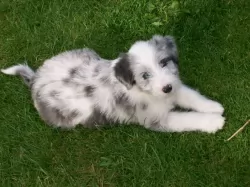 The Beardie is easy to recognize because of the longer hairs on the cheeks, chin and under the lower lip. This medium-sized Bouncing Beardie is usually the great family pet because he is very friendly and loving. This breed is extremely active and they are energetic despite their longer bodies. They grow up to have more than one coat colour, but they are all born one coloured. They always have white or cream markings. This smart dog can be very stubborn and independent, if you keep your dog in a yard, he will use every chance to escape.
The Beardie is easy to recognize because of the longer hairs on the cheeks, chin and under the lower lip. This medium-sized Bouncing Beardie is usually the great family pet because he is very friendly and loving. This breed is extremely active and they are energetic despite their longer bodies. They grow up to have more than one coat colour, but they are all born one coloured. They always have white or cream markings. This smart dog can be very stubborn and independent, if you keep your dog in a yard, he will use every chance to escape.
 The American Staffordshire Terrier is a strong, powerful dog – stocky, muscular and graceful. At one point in time the American Staffordshire Terrier and the American Pit Bull Terrier were considered to be the same breed. Even today there are those that make that argument, but they have been recognized outside the AKC as separate breeds. The AKC only recognizes the American Staffordshire Terrier and not the APBT. However – even though there have been decades of separation in breeding the American Staffordshire Terrier and the American Pit Bull Terrier are the very same dogs genetically.
The American Staffordshire Terrier is a strong, powerful dog – stocky, muscular and graceful. At one point in time the American Staffordshire Terrier and the American Pit Bull Terrier were considered to be the same breed. Even today there are those that make that argument, but they have been recognized outside the AKC as separate breeds. The AKC only recognizes the American Staffordshire Terrier and not the APBT. However – even though there have been decades of separation in breeding the American Staffordshire Terrier and the American Pit Bull Terrier are the very same dogs genetically.
The American Staffordshire Terrier has a broad skull, high set ears and pronounced cheek bones. Their ears should not be cropped by AKC standards and their eyes are far apart, round and dark. With a medium sized muzzle and a heavy muscular back, they are as powerful as they look, if not more so. Most have black noses. The AmStaff has a broad, deep chest with wide set forelegs and compact feet. The tail is short and tapered and it should not be docked.
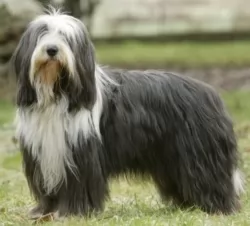 The Bouncing Beardie is great with children. They are very playful, jumpy and have generally very sweet and gentle personality. Children love them because they never get tired. If properly socialized, this dog can be the main attraction for any child.
The Bouncing Beardie is great with children. They are very playful, jumpy and have generally very sweet and gentle personality. Children love them because they never get tired. If properly socialized, this dog can be the main attraction for any child.
Herding, agility shows, obedience competitions, treibball, show dogs, trally...
This breed is very friendly. If your family is about to raise the Bearded Collie, prepare to have a pet that is highly affectionate and bonded with the members of the family. They don’t do well if left alone. They usually don’t bark and they are never destructible, but loneliness somehow triggers odd behaviour with this breed. They are not usually scared of strangers. If they are trained and socialized, you will be able to take your Beardie anywhere you go.
Some say that is very easy to train the Bearded Collie. The rule for this breed is to start the obedience training while they are very small. They are generally very independent, and they will try to do things in their own way. If you start your training early before your Beardie forms this kind of personality, you will have a wonderful pet.
 The American Staffordshire Terrier is a loving, gentle dog that wants nothing more than to be with and please his people. Contrary to his reputation as a “killer”, this dog is actually a lover. They are great with children and want to be a part of the family. They even think they are lap dogs, regardless of their size. They are never going to be aggressive toward people and even though they are not one-person dogs, they are loyal, and they are devoted to the family and the “leader of the pack”.
The American Staffordshire Terrier is a loving, gentle dog that wants nothing more than to be with and please his people. Contrary to his reputation as a “killer”, this dog is actually a lover. They are great with children and want to be a part of the family. They even think they are lap dogs, regardless of their size. They are never going to be aggressive toward people and even though they are not one-person dogs, they are loyal, and they are devoted to the family and the “leader of the pack”.
This breed can tell who is their friend and who is not. They are not aggressive, but they will protect their own. They are courageous, confident, attentive, bold and strong-willed. The AmStaff gets along with other dogs most of the time, but they will never back down from a challenge and should never be left unsupervised with another dog. They should not be loose in a neighborhood or at a dog park. No matter how much you trust your American Staffordshire Terrier they can be killers in any fight with another dog.
In addition to this you must socialize and train your AmStaff. You need to be the pack leader and be in control. The AmStaff wants to please you so for a strong leader they will respond positively to positive training. They are intelligent and pick up quickly on what you want them to do. However, they are incredibly strong physically so training them to heel and walk with you obediently is a must. A well trained and exercised American Staffordshire Terrier is a happy dog and a loyal family dog.
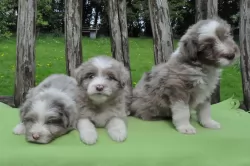 This breed is generally very healthy. They don’t have some major health issues. Some of the issues that are registered are:
This breed is generally very healthy. They don’t have some major health issues. Some of the issues that are registered are:
The degenerative disease that causes the blindness.
When the hormone produced by the thyroid gland is abnormally low.
That is generally the hereditary disease, can also be caused by bad diet or injuries.
To food, chemicals, pollen, dust...
That usually happens because of their dropped ears that are not very easy to clean.
 For the most part the American Staffordshire Terrier, like most of the “pit bulls” is a hearty, healthy dog. They have a few tendencies that breeders should test for including hip dysplasia, allergies, and heart issues. They can test for Cerebellar ataxia, which has affected the AmStaff with a progressive decline in their ability to control their muscles and coordination.
For the most part the American Staffordshire Terrier, like most of the “pit bulls” is a hearty, healthy dog. They have a few tendencies that breeders should test for including hip dysplasia, allergies, and heart issues. They can test for Cerebellar ataxia, which has affected the AmStaff with a progressive decline in their ability to control their muscles and coordination.
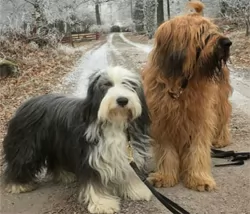 Raising your Bearded Collie pup on a high-quality food is usually enough for a puppy. Make sure that portions are appropriate for his age and weight. Once your pet is more than six months old, they will need only two meals per day. They get obese very easy. Don’t train them with the treats.
Raising your Bearded Collie pup on a high-quality food is usually enough for a puppy. Make sure that portions are appropriate for his age and weight. Once your pet is more than six months old, they will need only two meals per day. They get obese very easy. Don’t train them with the treats.
To care for your Bearded Collie, you must be aware of the grooming responsibilities that come with this longhaired pet. During the shedding period, it is required to brush them daily. Bathing is not a regular necessity but it will be easier to keep him clean and well groomed if you care about your pet all the time. Some people like to shorten the coat for their Beardie, and it is usually done during summer. Make sure to take him to regular ear, eye, teeth and hip vet checks.
The Bearded Collie is a breed that requires daily activity. They have very playful nature and they love to run, play and spend time outdoors. The best option will be a big yard so that Beardie can run for hours without the leash.
 feed You can feed your American Staffordshire Terrier either commercially purchased food or food you make yourself if the quality is high, nutrition is good, and the amount eaten is determined by the owner. Do not free feed. The AmStaff has the tendency to become obese. Its ok to use treats for training and rewards, as long as its use is controlled.
feed You can feed your American Staffordshire Terrier either commercially purchased food or food you make yourself if the quality is high, nutrition is good, and the amount eaten is determined by the owner. Do not free feed. The AmStaff has the tendency to become obese. Its ok to use treats for training and rewards, as long as its use is controlled.
As previously mentioned the American AmStaff Terrier has a tendency toward a few health issues. Hip Dysplasia – this condition causes a lot of pain and disability. It leads to different types of arthritis and degenerative joint disease. Cardiac Issues – Congenital heart disease consists of vessel malformation and lesions.
The AmStaff can be susceptible to Autoimmune Thyroiditis. This is a form of hypothyroidism developed by dogs. It is usually seen between 2 and 5 years of age. Continual retesting is recommended.
This is the most dangerous disease possibility that the American Staffordshire Terrier faces. There is a test for this condition which causes the AmStaff to display an inability to control their muscles and a loss of balance, to the point of falling. This is a progressive disease that often leads to euthanasia. The Staffordshire Terrier Club of America suggests that AmStaffs carrying the NCL genes should never be bred.
The American Staffordshire Terrier is an energetic, and athletic dog that loves to play and needs plenty of exercise. This breed is oriented to people and should never be left alone in the yard all day as a way for her to exercise. She needs you to play with her. If you cannot do this, then you should not own this breed of dog. This breed also loves to play canine sports. They thrive on games like dock diving, agility and obedience competitions. They excel at search and rescue. These are competitive dogs that want nothing more then to please their people.